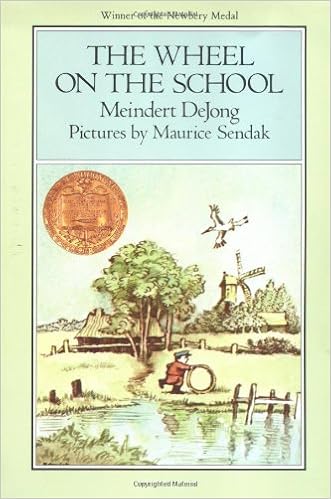Challenge Prompt: Read a book set somewhere you've always wanted to visit
Setting: Shora (analog for Wierum), province of Friesland, the Netherlands
Pages: 298

You may or may not know this, but in 1897, my great-grandfather was born in Sint Annaparochie, a little town of about 4,000 people, in the Dutch province of Friesland and near the coast of the North Sea. Due to this fact, and the fact that the vast majority of my mom's family comes from the Netherlands, "the low countries" has long been tops on my list of places to visit.
Some 30 kilometers away from Sint Annaparochie is Wierum, Meindert DeJong's birthplace and the basis for the town of Shora in his Newbery Medal-winning book The Wheel on the School. Shora is more than just a setting in this book; the town and its environment are characters in the story, forcing plot action and development. This particularly comes into play late in the book, but is present throughout the story.
The Wheel on the School tells the story of the six schoolchildren of Shora and their search for a wheel. If this sounds like a random, odd search, it has a purpose. Lina, the only girl in Shora's school, begins one day to wonder why storks never come to Shora when they come to other villages in the area. The schoolchildren determine that they need to put a wheel on the roof of the school to give the storks a place to nest since there are no trees around.
The problem is, there are no spare wheels just lying around in Shora. The kids have to look all over the place - even where a wheel couldn't possibly be - and get help from villagers eager to bring storks back to Shora. At times, the story almost feels like one of those Nancy Drew adventure games, where you have to complete this task to get something you need for another task, which you need to complete to meet your main objective, and so on and so forth. That's not a knock on the story; quite on the contrary, I enjoyed the intertwining storylines. The kids have many intriguing adventures and meet many new people on their quest for a wheel.
As I mentioned before, Shora and its environment act as characters in the book in the same way that Wonderland acts as a character in Alice's Adventures in Wonderland. Whether Lina and the others are climbing the dike, jumping ditches, getting stuck on a stranded boat as the tide comes in, or digging things out of the mud, nature plays a large role in this story. As I chose this book because it is set in a place where I want to visit, I very much enjoyed reading about Shora - DeJong's writing was so descriptive that I felt like I was there.
Final Recommendation: Read it! It is charming, descriptive, dramatic, and wonderful. If you're looking for something super intellectually deep, this probably isn't it - it is, after all, a kids book. But that isn't to say it's shallow. It has valuable lessons for kids and adults and is a thoroughly enjoyable read.

